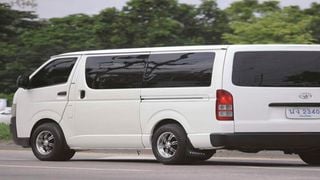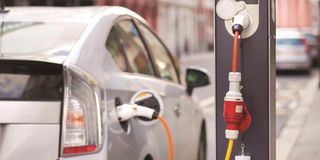
Toyota van
| PoolDN2
Premium
What’s the ideal engine for matatu business?
I prefer diesel. Diesel engines provide a lot of torque with minimal effort, which is a plus since you are transporting cargo, both human and non-human. Torque is your friend as far as load-toting is concerned. However, it is not an open-and-shut case as one may think.
Hi Baraza,
Thanks for your weekly insight matters motoring.
I want to start a matatu business, but I’m torn between a petrol or diesel Toyota Hiace. Which of the two would be ideal regarding maintenance and durability, plus distance-wise? What are the pros and cons of each?
I am patiently waiting to hear from you.
Flavian
Hi Flavian,
I was once in the matatu industry. Don’t ask for details.
The preference here is diesel, and it’s obvious to see why. Diesel engines provide a lot of torque with minimal effort, which is a plus since, at the end of the day, you are transporting cargo, both human and non-human. Torque is your friend as far as load-toting is concerned.
Diesel engines also give excellent fuel economy, and we all know the highest cost in any transport business is fuel. Despite my placing it second in this response, the fuel economy is the primary reason operators prefer diesel engines to petrol.
However, it is not an open-and-shut case as one may think. There are other factors to consider, and you, incidentally, have asked about these specific factors: maintenance and durability.
Not cheap to maintain
Diesel engines are not cheap to maintain. The parts cost a lot more money, and the engines have shorter service intervals. Modern diesel engines are all turbocharged, which adds an element of added complexity that can further exacerbate maintenance costs due to operator error (early turbo engines in the PSV sector had a high failure rate before drivers were educated, with a major contribution from this column, on how to effectively and efficiently operate a turbo engine).
Longevity: people see trucks and buses doing millions of kilometres in their operational lifetimes and think diesel engines last longer than petrol ones, but that is because no one does petrol engines for trucks and buses. If they did, people would discover that petrol engines last longer. When comparing like-for-like in non-commercial applications, petrol engines outlast and outdrive diesel ones. All you have to do is get on the internet and search for the highest mileage personal cars out there. They’re all petrol-powered (ignore the German Benzes, they’re taxis hence commercial).
There is a third very vital factor that offers petrol an advantage over diesel: asking price. Petrol powered commercial vehicles are much cheaper than diesel-powered ones. Take note I said “commercial vehicles” because some sections of private car ownership (such as the aforementioned German Benzes), petrol-powered units carry a considerable cost. In contrast, diesel units can be had for next to nothing.
That being said, while petrol engines are superior on the two criteria you have selected (maintenance and longevity) and purchase price, you are in business at the end of the day. Your biggest overhead is fuel, and there is no comparing diesel to petrol. No contest.
The Hiace comes with a choice of two petrol engines: the 1TR, which is 2.0 litre (underpowered and inappropriate for very long drives under load) and the 2TR, which is the same 2.7 litre used in the Prado and the Hilux (it’s thirsty, and it is the same 2TR that people describe as “underpowered” when deployed in the Prado). There ARE PSVs with these engines running around, but you’ll notice a lot of them end up on sale very quickly to live a new life as a school shuttle or a tour van where torque is not a very major factor.
Just buy a diesel Hiace.
I can talk about bikes, but I won’t do a review

Motorbike
Hello Baraza,
There has been a growth of private bikers in Kenya. Is it possible to review motorbikes in one of your Wednesday articles?
I can talk about them - negatively, for the most part - but I cannot review them to save my life. This is why:
They’re noisy, uncomfortable, and hazardous. Hazardous does not even begin to do justice as an adjective for the it or as an adverb for the mere act of riding one.
I made one attempt at learning to ride. One. That’s it. I failed to straddle the bike properly; I fed in enough throttle to walk the fine line between ample torque and discretionary drive-by audio levels, slowly let the clutch out, and what did the stupid contraption do? It escaped. It escaped from me. Even wild horses are more disciplined than that. Is a motorbike a machine or a feral animal?
Now, you mention private bikers. I know these people. A good number of them are friends of mine, which is why I must clarify this: it is motorbikes that I dislike, not the riders themselves; I have the utmost respect for them: their discipline, their unity, their calmness and readiness to face death every single time they mount their steel steeds; it is admirable, despite their questionable choice of personal transport - but who am I to judge? I once had a Peugeot. We all make mistakes. However, these private bikers are heavily outnumbered by a sprawling menace we usually call the bodaboda.
There is nothing good to say about bodabodas, so I won’t even bother.
So there you have it. It will be a long wait before I ever do a review of a motorbike in this column. I can talk about them, but I won’t review them.

An electric car charging at a station.
What are the pros and cons of hybrid and EV vehicles?
Hello JM,
Though most of us are still half-sold on the benefits of owning a hybrid or EV car, it’s a development we can’t ignore. I think we fear that we might not know what to do if it breaks down.
Now, could you kindly help us as laymen who follow on your articles dedicatedly to embrace the new technology of hybrid vehicles by educating us on what we need to know so that those who have them can take preventive measures in running them?
Lastly, my plea to drivers, please learn to dim lights at night for fellow motorists rather than dazzling them to make our road more secure and safe for everyone.
Mikey
Hello Mikey,
I have talked lightly about EVs and hybrids in the past, and my advice has always been along the lines of caveat emptor: buyer beware. There is nothing inherently wrong with hybrids and EVs - if anything, they have very quickly proved to be superior to good ol’ internal combustion; we lack the necessary infrastructure to support the burgeoning technology, and the political will incentivise their rapid induction into regular and widespread use.
What infrastructure is this? Charging stations for EVs, to start with. They are few and not so far between they’re all clustered within Nairobi. Our national grid is not the most stable, either. Yeah, I said it. Every night, my neighbourhood suffers rolling electrical blackouts. We lack the training and knowledge to maintain and repair these cars. Spares, especially replacement batteries, are expensive.
As far as political will goes, it does not have much to do with which person you prefer to vote for, but the willingness of the prevailing authorities to implement policies in your favour. A lot of developed countries saw a surge in EV numbers because their respective governments first informed their citizenry of the advantages of alternative power sources before putting up the infrastructure above to smoothen the transition to these alternative power sources and finally incentivised the people to embrace the technology through financial means such as tax waivers and cash-back protocols whereby your government pays you to buy an EV (and no, it’s not a discount. The discount comes from the manufacturer who has been given government subsidies to avoid eating into their profits. This makes the EV affordable. Once you buy one, you present proof of an EV to the government, which gives you a cheque in exchange).
We have a long way to go as a country and as a society. We won’t lie to ourselves that our government will pay us to buy EVS - knowing them, they will tax the hell out of these EVs to squeeze as much money as they can from us, we are not new to these shortsighted tactics of theirs - but like a quote from the first Matrix film that I have used before: that, Mr Anderson, is the sound of inevitability. Despite what Mobius Motors and Sagak Auto Tech are attempting individually, our automotive industry is wholly dependent on trickle-down technologies. As the developed world fully embraces hybrid and EV technology, we, the lovers of sloppy seconds, have no choice but to take it up as well.
The EVs are not coming; the EVs are here.
***
The scourge of high beams has made me avoid night driving completely. Couple the high beams to rapid road construction, which means the road yesterday is not the same as it is today, plus materials and equipment parked haphazardly means driving at night is not entirely dissimilar to riding a motorbike as described in the above correspondence: you are gambling with your mortality.
Catch me dead (almost literally) driving at night.
Send your motoring questions to [email protected]





